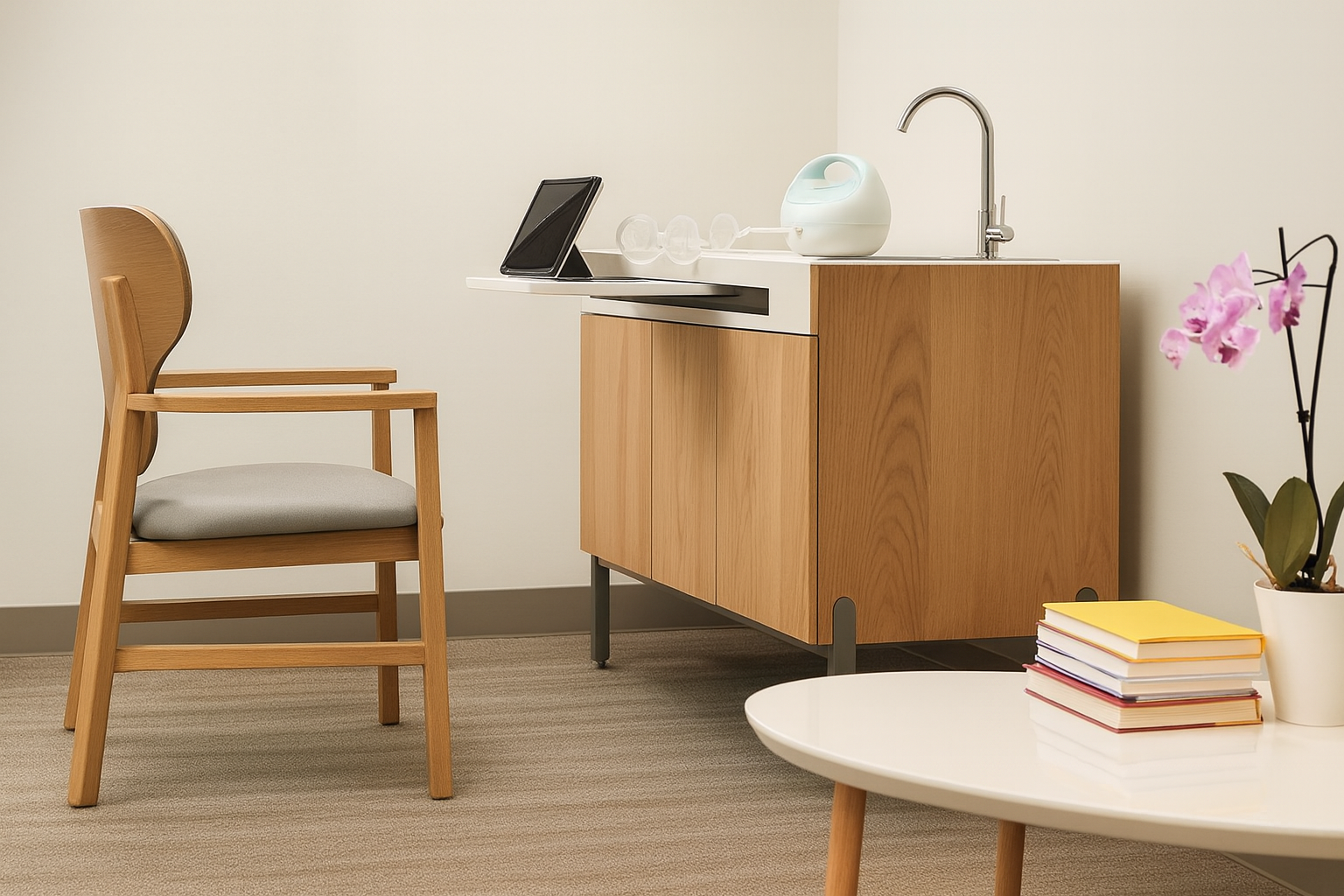Why Supporting Nursing Parents Is Good for Business
If you’re a supervisor, HR director, or manager, you’ve likely seen firsthand how employee needs shape workplace culture. One of the most overlooked, yet impactful, accommodations is a proper lactation room. Far from being a “nice to have,” providing a clean, private, and well-equipped space for nursing parents is increasingly recognized as a workplace essential.
The benefits stretch well beyond compliance with state or federal laws. Lactation rooms contribute directly to employee morale, retention, and even productivity. They represent a tangible way for organizations to prove that they value their people, while simultaneously protecting their bottom line.
A Private Space Builds Trust and Loyalty
Imagine being a new parent returning to work, already juggling sleepless nights and major life changes. Now imagine being told the only space available to pump milk is a storage closet. The message is clear: convenience for the company outweighs comfort and dignity for the employee.
A designated lactation room flips that script. It signals respect, privacy, and a recognition that employees are more than just workers; they’re whole people with real needs. That level of consideration builds trust, strengthens loyalty, and makes employees feel they belong in the organization for the long term.
For managers worried about turnover, the numbers speak volumes. Studies show that companies offering strong family-supportive policies retain talent more effectively, saving costs associated with hiring and training replacements. A lactation room becomes a small investment with a big return.
Productivity Rises When Stress Levels Drop
Stress is productivity’s worst enemy. Nursing mothers who don’t have access to a proper space to express milk often report higher stress, lower focus, and more frequent absences due to health issues. In contrast, when employees are provided with a comfortable, hygienic space, they can manage their needs quickly and return to work more focused.
It’s a simple equation: less stress equals more energy for work. Employees aren’t wasting time hunting for private spaces, negotiating with coworkers for room access, or worrying about milk storage. Instead, they can dedicate that time and mental space back to their core responsibilities. Managers and supervisors see the benefits directly: fewer interruptions, more consistent workflow, and healthier, more engaged staff.
Inclusive Policies Strengthen Workplace Culture
Workplace culture isn’t defined by words in a handbook; it’s built on everyday experiences. Employees watch closely to see whether stated company values are truly reflected in practice. When organizations provide accessible lactation accommodations, they’re sending a powerful message: we mean it when we say inclusivity matters here.
This matters not only for nursing parents but for the entire workforce. Colleagues who witness their employer prioritizing equity and care are more likely to feel proud of their workplace, which strengthens culture across departments. For leadership, this is a chance to demonstrate values in action, inspiring loyalty not just from nursing parents but from everyone who values fairness and support in the workplace.
Retention Improves When Employees Feel Supported
Turnover is expensive. Recruiting, hiring, and training new employees can cost thousands of dollars per position, not to mention the productivity lost during transitions. For new parents, the decision to stay or leave often hinges on whether their employer provides the support they need.
Lactation rooms can play a pivotal role in that decision. By giving employees confidence that they can return to work without compromising their family responsibilities, businesses reduce attrition and preserve institutional knowledge. For managers and supervisors, this translates into less disruption, stronger team stability, and improved long-term performance.
Health Benefits Reduce Costs for Employers
The benefits of a lactation room extend beyond the walls of the office; they directly impact health. For nursing parents, the ability to express milk regularly reduces the risk of conditions like mastitis or blocked ducts, both of which can lead to absences or costly medical care. For infants, breast milk supports stronger immune systems, which can mean fewer pediatric visits and less time off for parents.
Healthier employees are more present and more engaged. For employers, this reduces healthcare costs, lowers absenteeism, and boosts productivity. A lactation room becomes more than an amenity; it’s a strategic health benefit that directly improves the bottom line.
A Competitive Advantage in Recruitment
In today’s job market, benefits go far beyond salary. Candidates are increasingly evaluating workplaces based on culture, inclusivity, and flexibility. Organizations that visibly support working parents have an edge in attracting top talent.
A lactation room is a visible and tangible symbol of that support. When job seekers tour your facility or research your company, knowing that accommodations exist for nursing parents demonstrates forward-thinking leadership. This is particularly important in industries where competition for skilled employees is high, and where diversity and equity commitments are scrutinized by both candidates and clients.
Practical Features That Make a Difference
A lactation room is not just about compliance; it’s about usability. The features included can determine whether the space truly supports employees or simply exists on paper. Practical considerations include:
- Comfortable seating that supports posture during pumping
- Flat work surfaces for equipment and supplies
- Reliable power outlets to accommodate pumps and devices
- Sanitation access, including sinks for washing hands and bottles
- Milk storage solutions, such as a private refrigerator
- Privacy and soundproofing to ensure employees feel secure
When these elements come together, the room is not just compliant, it’s functional, efficient, and genuinely supportive. For supervisors responsible for employee well-being, these details make the difference between a box-checking exercise and a true benefit.
How Supervisors and Managers Benefit Directly
While lactation accommodations primarily serve nursing parents, supervisors and managers gain as well. Supporting employees through life transitions builds stronger teams, reduces HR conflicts, and ensures smoother workflows. Managers who advocate for lactation rooms often find themselves recognized as forward-thinking leaders who understand the human side of business.
By creating environments where employees feel respected, managers reduce grievances, limit legal risk, and improve performance reviews for their departments. It’s not just about doing the right thing, it’s about doing the smart thing for team success.
Moving From Obligation to Opportunity
Some organizations approach lactation room requirements with reluctance, seeing them as one more regulation to meet. But the most successful companies flip the script. They see these requirements as opportunities to lead with values, improve workplace culture, and strengthen long-term business outcomes.
When framed as an investment in people, rather than a burden, lactation rooms become one of the simplest ways to make a measurable impact on both morale and productivity. Supervisors and leaders who adopt this mindset create environments that employees want to join and stay in.
Conclusion: Nessel Makes Compliance and Care Simple
While federal law establishes a baseline requiring employers to provide break time and a private space for nursing parents, states like California, New York, Illinois, and Massachusetts add their own rules and expectations on top of that foundation. In practice, this means the core responsibility is the same everywhere; employers must ensure space, time, and dignity, but the exact requirements vary depending on where your workplace is located. Some states go further with stricter standards, enforcement measures, or specific provisions around the quality and accessibility of lactation accommodations.
What varies, then, is not the obligation itself but how organizations choose to meet and exceed those layered requirements. This is where Nessel comes in. With solutions ranging from private Lactation Pods in multiple sizes, to the all-in-one Lactation Station with ergonomic chair, sliding desk, outlets, refrigeration, and optional sink, to Lactation Chairs and Portable Sinks that add comfort and sanitation to existing rooms, Nessel offers a portfolio that makes compliance seamless and care intentional.
For supervisors, HR leaders, and managers, the choice is simple. Meeting the legal requirements is the baseline, but exceeding them sets your workplace apart. With Nessel, you can provide lactation rooms that are practical, compliant, and truly supportive, turning a legal obligation into an opportunity to build loyalty, health, and productivity.
%404x.png)




%404x.png)
